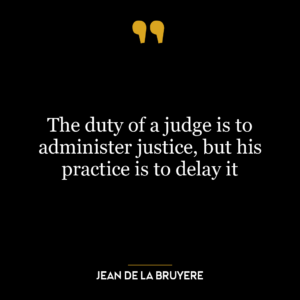This quote is a powerful statement about guilt and justice. The speaker is addressing someone who has committed crimes that have gone unnoticed or unpunished by the law. The term ‘wretch’ indicates a deep contempt for this person, suggesting they are morally reprehensible, and the phrase ‘tremble, thou wretch’ implies that they should be terrified of the consequences of their actions.
The ‘undivulged crimes’ refer to wrongdoings that have been kept secret, not revealed or confessed. The ‘unwhipped of justice’ suggests that these crimes have not yet been punished by the law or society. So, the quote speaks to the fear and anxiety that can come from carrying the weight of secret guilt, and the inevitable dread of impending justice.
In today’s world, this quote could be applied in many contexts. It could refer to those who commit crimes or unethical acts and think they have gotten away with it. Whether it’s corruption, fraud, or any other form of wrongdoing, the quote suggests that even if these crimes are not immediately exposed or punished, the perpetrators live with the constant fear of being found out and facing justice.
In terms of personal development, this quote could serve as a reminder of the importance of honesty, integrity, and the consequences of our actions. It emphasizes that even when we think no one is watching, our actions have an impact and consequences, whether immediate or delayed. It encourages individuals to strive for ethical behavior, not out of fear of external punishment, but because it’s the right thing to do. It also suggests that living with guilt or the fear of retribution can be a punishment in itself, often more tormenting than any external penalty.










